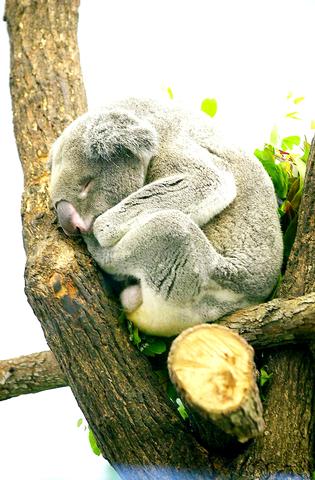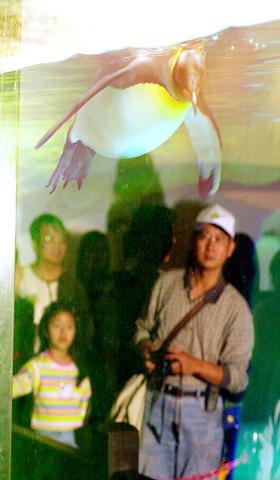After a 65-day wait, the dreams of an entire nation were shattered Friday when the Taipei City Zoo announced the death of what would have been Taiwan's first penguin to be hatched in captivity.
As the entire nation mourned the death of the marine bird embryo, animal rights groups expressed their concern over the introduction of exotic animals to the zoo, questioning the reason why such establishments exist at all.

PHOTO: CHIANG YING-YING, TAIPEI TIMES
Following the koala craze last year, the zoo imported four king penguins in September, with plans to add 10 more king penguins and 30 black-footed penguins to the group.

PHOTO: CHIANG YING-YING, TAIPEI TIMES
Taipei Mayor Ma Ying-jeou (
In subtropical Taiwan, the arrival of the four Antarctic creatures has sparked a frenzy among the media and the public. As the media provided a daily update of the egg's progress, zoo-goers, mostly children, queued up in kilometer-long lines for up to two hours each weekend just for a 20-second glimpse of it.
As of Nov. 27, the zoo had seen 5 million visitors this year. The last time the zoo had a turnout approaching this figure was last year when the two koalas imported from Australia were introduced to the public.
When the zoo relocated from Yuanshan, Shihlin District to its current premises in Mucha, Wenshan District in 1986, it attracted about 5.3 million people.
Attempting to explain the amazing popularity the penguins have aquired among Taiwan's public, some observers say that the birds, which hail from freezing climes, are seen as "exotic" animals in subtropical Taiwan.
Others say the zoo's record attendence figures can be explained as a backlash against Taiwan's politics.
The drama revolving around the four penguins has certainly captured the public's imagination. Originally, the zoo intended to import two male and two female penguins from Japan. For some reason, however, it received three females and one male.
Once the male penguin had picked his mate, she laid an egg five days after the penguin house was opened to the public on Sept. 23.
Except for the first few days after the egg was laid -- during which time the female sat on it -- the male incubated the egg continuously.
When it first became clear that there was little sign of the egg hatching, zoo keepers initially planned to replace it with a fake and have the real one examined to find out whether it was fertile or not.
They ultimately delayed action until the 65th day, however, when zoo authorities confirmed that the egg was fertile but the embryo had died during the later stage of the incubation. The normal incubation period for a penguin egg is 65 to 68 days.
Money is no object
Taipei City Zoo also plans to introduce giant pandas. The proposal has received the endorsement of the mayor, and the zoo authorities claim that they have the ability to breed, raise and manage the bears.
Zoo Director Yang Sheng-hsiung (
"Selling more tickets is definitely a good thing but not our main goal. Our concern is more to educate the public about animal conservation," he said.
Just how effective, though, is the education when thousands of people are forced to line up for hours and crowd into a single room just for a 20-second glimpse of the animal?
"The huge crowds of people are bound to dwindle as the fuss dies down. We encourage visitors to take advantage of the tour guide services and useful literature and posters," Yang said.
The idea of introducing giant pandas to Taipei's zoo is not new. It dates back to the 1980's when the Zoological Society of Taipei (
The idea was first initiated by the incumbent chairman of the society, Hung Wen-tung (
"Back then, the tourism industry had not been liberalized and the Taipei City Zoo had few rare animals to attract visitors. Hung thought that it might not be a bad idea to bring the animals from elsewhere in the world to Taiwan, particularly giant pandas," Li said.
After years of visits and negotiations, Li said, China issued the requisite country-to-country animal export license twice but both were turned down by the Council of Agriculture.
"They didn't give us any specific reason, but it's not hard to figure out," she said, adding that political issues played a significant role.
Just as talk of importing giant pandas seemed to be quieting down, it has recently been brought up again. According to Li, China is still interested in exporting a pair of pandas to Taiwan.
"If it still doesn't work this time, we'll try to import other unique animals such as the golden snub-nosed monkey, Japanese crane and Siberian tiger," Li said.
The organization two years ago signed a treaty with the Zoological Society of China (
Noah's ark
Despite the educational and social role claimed by the zoo authorities, animal rights groups have expressed strong opposition to the introduction of rare animals from overseas and, indeed, to the very existence of zoos.
"A zoo is not a Noah's ark, it doesn't need to have a comprehensive collection of the world's animals," said Chen Yu-min (
Master Wu Hung (
"A zoo is supposed to play a role in animal education, conservation, and restoration. The zoo not only has done none of these, but also has made itself more and more commercialized and entertainment-oriented," he said, adding that he is in favor of the idea of shutting down all Taiwan's zoos and aquariums.
Taiwan currently has four public zoos and two public aquariums. The four public zoos are located in Taipei, Kaohsiung, Hsinchu, and Nantou. The two public aquariums are located in Pintung and the offshore island of Penghu.
More efforts, Wu Hung said, should be put into the conservation and breeding of animals that are unique to Taiwan.
"Remember Taipei City Zoo is under the jurisdiction of the Bureau of Education, not some tourism or business department," he said. "Animals should not be treated as commodities nor used as a tool for any political purposes. Peace across the Taiwan Strait can only be reached through mutual understanding and respect."
The Environment & Animal Society of Taiwan is the organization which recently launched a campaign against China's bear farming and bear bile trade.
The campaign is part of a worldwide crusade initiated by the UK-based World Society for the Protection of Animals (WSPA).
Bear farming was adopted in China in 1984. The bile is extracted from the animals through a tube inserted into their gallbladders.
Though the method does not involve killing the bear, international conservationists and animal rights groups are strongly against it because they believe it is cruel.
Years ago the organization staged campaigns against Taipei City Zoo's failed attempt to import a polar bear from Canada following the death of two polar bears that were to be brought in from a zoo in Switzerland.
Chen is also concerned about the high level of animal fatalities at the zoo and the high construction costs of animal houses.
"It's a costly business to run a zoo, and it's just not right nor natural to have animals live in an environment which costs a lot of money to build to simulate their original natural habitat," she said.
According to zoo authorities, the penguin house is one of the most costly of the zoo's facilities. It cost about NT$30 million to build, while the koala house cost about NT$7 million. A panda house might cost about NT$90 million to build.
The zoo has also budgeted NT$200 million to build a new butterfly and insect house on the spot where the current butterfly house now stands.
The cost of feeding the zoo's 26,000 or so animals of over 300 different species is also huge. The two koalas alone account for NT$500,000 and the four penguins about NT$80,000 of total annual feeding costs of up to NT$30 million.
Shen Li-yu (
"Polar bears do not belong in sub-tropical Taiwan, nor do penguins or pandas," she said. "No man-made living environment can be as good as their own natural habitat. Whatever facility is claimed to be as good as the animals' original habitat is judged according to the standards of humans, not the animals."
Shen's views were echoed by Sakya Chun-fa (傳法師父), secretary-general of the Life Conservationist Association (
"The best way to understand animals is to see them in the wild. They don't deserve to be captured, transported over long distances and eventually sold to a zoo," she said.
But are animals really better off in the wild than in the zoo?
"Well, if we keep interfering with their territory, we'll eventually have to pay the price," she said.

MAKING WAVES: China’s maritime militia could become a nontraditional threat in war, clogging up shipping lanes to prevent US or Japanese intervention, a report said About 1,900 Chinese ships flying flags of convenience and fishing vessels that participated in China’s military exercises around Taiwan last month and in January have been listed for monitoring, Coast Guard Administration (CGA) Deputy Director-General Hsieh Ching-chin (謝慶欽) said yesterday. Following amendments to the Commercial Port Act (商港法) and the Law of Ships (船舶法) last month, the CGA can designate possible berthing areas or deny ports of call for vessels suspected of loitering around areas where undersea cables can be accessed, Oceans Affairs Council Minister Kuan Bi-ling (管碧玲) said. The list of suspected ships, originally 300, had risen to about 1,900 as

Japan’s strategic alliance with the US would collapse if Tokyo were to turn away from a conflict in Taiwan, Japanese Prime Minister Sanae Takaichi said yesterday, but distanced herself from previous comments that suggested a possible military response in such an event. Takaichi expressed her latest views on a nationally broadcast TV program late on Monday, where an opposition party leader criticized her for igniting tensions with China with the earlier remarks. Ties between Japan and China have sunk to the worst level in years after Takaichi said in November that a hypothetical Chinese attack on Taiwan could bring about a Japanese

MORE RESPONSIBILITY: Draftees would be expected to fight alongside professional soldiers, likely requiring the transformation of some training brigades into combat units The armed forces are to start incorporating new conscripts into combined arms brigades this year to enhance combat readiness, the Executive Yuan’s latest policy report said. The new policy would affect Taiwanese men entering the military for their compulsory service, which was extended to one year under reforms by then-president Tsai Ing-wen (蔡英文) in 2022. The conscripts would be trained to operate machine guns, uncrewed aerial vehicles, anti-tank guided missile launchers and Stinger air defense systems, the report said, adding that the basic training would be lengthened to eight weeks. After basic training, conscripts would be sorted into infantry battalions that would take

DEEP-STRIKE CAPABILITY: The scenario simulated a PLA drill that turned into an assault on Taiwan’s critical infrastructure, with the launchers providing fire support Taiwan yesterday conducted this year’s first military exercises at Longsiang Base in Taichung, demonstrating the newly acquired High Mobility Artillery Rocket System’s (HIMARS) ability to provide fire support and deep-strike capabilities. The scenario simulated an attack on Penghu County, with HIMARS trucks immediately rolling into designated launch areas and firing barrages at the Wangan (望安) and Cimei (七美) islands, simulating the provision of fire support against invading forces. The HIMARS are supposed to “fire and leave,” which would significantly increase personnel and equipment survivability, a military official said. The drill simulated an exercise launched by the Chinese People’s Liberation Army (PLA) Eastern